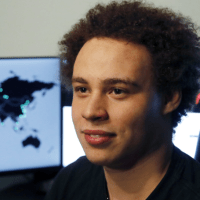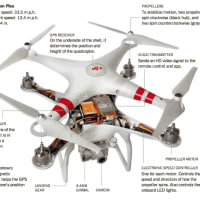
Emphasis On Innovation Could Boost U.S. Economy
技術革新の強化が米経済を建て直す
アメリカからベンチャー精神が消えていく、成熟社会の辿る道か?
by Wendy Kaufman
July 13, 2011
President Obama tours Cree, Inc., a manufacturer of energy efficient LED lighting, in North Carolina on June 13. Economists believe the innovation of new technology would create jobs and boost the economy.
6月13日、ノースカロライナの省電力LEDライトの工場であるクリー社を視察するオバマ大統領。 経済専門家は新しい技術の革新こそが新規の雇用を生み出し、経済を活性化すると言う。
July 13, 2011
In a sluggish economy with slow growth and high unemployment, innovation may be part of the solution.
Tom Clement is just the sort of entrepreneur the U.S. needs to propel the economy. He loves brainstorming and developing new ideas and turning them into products and companies.
低成長と高い失業率で低迷する経済の中にあって、技術革新が解決策になりうるであろう。 トム・クレメントはまさに経済を促進するために米国が必要とする企業家の一人である。 彼はブレインストーミング(自由な発想)をし、新しいアイデアを追求して、それを製品や会社に生かしていくことが好きである。
Back in the mid-1980s, he climbed Mount Everest. When his friends asked if he was frightened, he told them no, just excited. Clement says starting a new business is a lot like scaling mountains .
"It's that same sense of just being out there, putting yourself out there — that part of you that wants to take a risk, that enjoys that feeling of uncertainty and needing to figure things out as you go," he says.
遡ること1980年代中期、彼はエベレストに登頂した。彼の友人が怖くなかったかと彼に尋ねたとき、彼は興奮しただけで、怖くはなかったと答えた。クレメントは、新しいビジネスを始めるのは丁度、山をよじ登っていくようなものだと言う。「それはちょうどその場にいる感じ、自分自身を現地のそこに置いて・・・・・・自分のなかの、リスクを好んで賭ける部分、不確かさと同時に、前進しながら、それらに対してやることを解明していくことを楽しむんだ」と彼は言う。
Throughout the past 30 years, he has started or helped to start a number of companies in the medical device field — like the suburban Seattle offices of Pathway Medical Technologies, which makes a specialized tool physicians use to clear clogged arteries in the leg.
This sophisticated and innovative technology has created jobs. Six years ago, Pathway had 20 employees, today there are about 200. And Clement, a company co-founder, isn't sitting idly by. Just a few miles from here, he is starting two new companies and is already offering some people jobs.
But as the 55-year-old entrepreneur knows all too well, turning good ideas into new products and companies isn't easy. Still, it's something the U.S. has to do to keep the economy growing.
過去30年間を通して、彼は医療器械の分野において多くの会社を起こし、或いは起業するのを助けている。 例えば脚の血栓を除去するのに医者が使う装置を製作しているシアトル郊外のパスウェイ・メディカル・テクノロジー社がある。この高度で革新的な技術は雇用を創造した。6年前20人だった社員は、現在では200人。 そしてクレメントといえば、その共同創業者でありながら、留まってはいない。
そこから数マイル離れたここで、彼は2つの会社を起こして、既に雇用を創り出している。 しかし、全てをよく知る55歳の起業家だからこそ、良いアイデアを製品や会社に還元していくことの困難さを周知している。 経済を成長させ続けるためにも、今もってアメリカが取り組まねばならない重要なことである。
Stumbling Blocks 障害
Economist Ken Goldstein of the Conference Board explains that for the first part of the year, the U.S. economy grew very slowly — an annualized rate of only about 2 percent.
"Without innovation, not only would you be stuck at 2 percent — we might be lucky to get 2 percent growth," he says.
Goldstein says a concerted focus on innovation could boost growth by perhaps half a percentage point.
"And that's got to be worth, alone, maybe 50-, 75- maybe even 100,000 jobs a month," he says.
That's nothing to sneeze at when you consider that just 18,000 jobs were created last month.
コンファレンス・ボード(民間のビジネス調査会社)の経済専門家のケン・ゴールドスタインは今年の前半の米国経済は非常に緩やかに成長している・・・わずか2%の成長率と分析している。 「技術革新もなく、2%に留まっているというより、幸運にも2%も成長していると言うべきかもしれない。」と彼は言う。彼によると技術革新に焦点を志向するだけで、恐らく0.5%の成長をもたらすことができるとのこと。「それだけで、毎月5万、7万5千いや10万の雇用を確保することが可能となる。」 そのうえ、これらの雇用は、例えば先月創出した18000の雇用を圧迫する類のものではなく、上増しで積上げる雇用になる。
But innovation, and the jobs it creates, doesn't happen overnight. It takes time, and there's another stumbling block — money.
"Where we are right now is not a dearth of ideas, but the ability to finance those new ideas into new companies, new products, new services. It hasn't broken down, but it has slowed down," Goldstein says.
Right now, not much public money is being invested in innovation, and despite historically low interest rates, there's not all that much private-sector investment, either.
しかし、技術革新と、それを生み出す仕事は一夜にしてなせるものではない。時間がかかるし、もう一つの障害がある、それは資金だ。 「一番の問題はアイデアの枯渇ではなく、そのような新しいアイデアを新しい会社、新しい製品、新しいサービスに転換するための資金を提供する能力だ。その力は、なくなってはいないが、減速している。」と彼は指摘する。 今、公的資金が技術革新に投資されていない、そして歴史的な低金利にもかかわらず、民間部門でもそれに見合った投資がされていない。
Taking Risks
Rosabeth Moss Kanter, a strategy and innovation expert at Harvard Business School, says she believes that investors and companies remain skittish about the economy.
"Companies, for example, claim they want innovation," she says. "I sometimes talk to them and they say, 'We want more innovation, just not that idea or that idea, not that idea.' To have high levels of innovation, you need more people trying more things even if they fail."
Risk-taking and tolerance for failure have long been hallmarks of American business culture, and they've played a big role in making the U.S. the most entrepreneurial country in the world. But entrepreneurs elsewhere are beginning to take more risks.
ハーバート・ビジネススクールの戦略と技術革新の専門家であるローザベス・モス・カンターは投資家も企業も経済に関して弱気のままであると感じている。
「企業は、例えば、技術革新を望んでいると声高に言うが、彼らと話してみると、決まって‘我々はもっと技術革新が必要だ、それよりも、それよりも、それよりも・・’という。高いレベルの技術革新のためには、より多くの人とモノが、たとえ失敗しても必要だ。」 リスク・テーキングと失敗の許容はアメリカビジネス文化の長い伝統的特徴であった。そしてそれらが世界に冠たる起業家の国アメリカで大きな役割を演じていた。
"We used to attract the best and the brightest — people from other countries would come here to start business, discover new things, create jobs," Kanter says. "And now that talent might go back to their home country because they see those countries as full of opportunity."
Other countries are indeed gaining ground on the U.S. in innovation-related indicators — things like patent awards, and research and development spending. China, for example, is now a leader in clean energy.
「我々はかって最高で明晰な人々を惹きつけてきた ‐- よその国々から来た人々はこの地でビジネスをスタートさせ、新しいものを発見し、仕事を創造した。」「そして、今や、それらの才能豊かな人々はチャンスの多い自国に帰っていこうとしている。」とカンターは嘆く。他の国々は、技術革新関連の指標をみる限り、実際にアメリカのこの得意領域を侵食しつつある。 特許表彰数や開発費用がそれである。 例えば中国はいまやクリーン・エネルギーではリーダー的存在である。
But confidence here at home remains a huge problem. Innovation has a chicken-and-egg quality about it. You need innovation to spur the economy, but you need confidence in the economy to drive innovation. Harvard's Kanter puts it this way: Innovation will be stifled if a country is scared, afraid to invest and uncertain about the future.
しかし、この地の自信喪失は大きな問題のままだ。 技術革新はニワトリと卵の関係性を内包している。つまり、技術革新は経済を促進するが、技術革新を推し進めるには経済に自信がなければならない。 ハーバードのカンターはこのように結論付けて話を締めくくった。「国家が投資を恐れ、未来の不確実性を恐れるとき、技術革新は窒息してしまうだろう。」
技術革新の強化が米経済を建て直す
アメリカからベンチャー精神が消えていく、成熟社会の辿る道か?
by Wendy Kaufman
July 13, 2011
President Obama tours Cree, Inc., a manufacturer of energy efficient LED lighting, in North Carolina on June 13. Economists believe the innovation of new technology would create jobs and boost the economy.
6月13日、ノースカロライナの省電力LEDライトの工場であるクリー社を視察するオバマ大統領。 経済専門家は新しい技術の革新こそが新規の雇用を生み出し、経済を活性化すると言う。
July 13, 2011
In a sluggish economy with slow growth and high unemployment, innovation may be part of the solution.
Tom Clement is just the sort of entrepreneur the U.S. needs to propel the economy. He loves brainstorming and developing new ideas and turning them into products and companies.
低成長と高い失業率で低迷する経済の中にあって、技術革新が解決策になりうるであろう。 トム・クレメントはまさに経済を促進するために米国が必要とする企業家の一人である。 彼はブレインストーミング(自由な発想)をし、新しいアイデアを追求して、それを製品や会社に生かしていくことが好きである。
Back in the mid-1980s, he climbed Mount Everest. When his friends asked if he was frightened, he told them no, just excited. Clement says starting a new business is a lot like scaling mountains .
"It's that same sense of just being out there, putting yourself out there — that part of you that wants to take a risk, that enjoys that feeling of uncertainty and needing to figure things out as you go," he says.
遡ること1980年代中期、彼はエベレストに登頂した。彼の友人が怖くなかったかと彼に尋ねたとき、彼は興奮しただけで、怖くはなかったと答えた。クレメントは、新しいビジネスを始めるのは丁度、山をよじ登っていくようなものだと言う。「それはちょうどその場にいる感じ、自分自身を現地のそこに置いて・・・・・・自分のなかの、リスクを好んで賭ける部分、不確かさと同時に、前進しながら、それらに対してやることを解明していくことを楽しむんだ」と彼は言う。
Throughout the past 30 years, he has started or helped to start a number of companies in the medical device field — like the suburban Seattle offices of Pathway Medical Technologies, which makes a specialized tool physicians use to clear clogged arteries in the leg.
This sophisticated and innovative technology has created jobs. Six years ago, Pathway had 20 employees, today there are about 200. And Clement, a company co-founder, isn't sitting idly by. Just a few miles from here, he is starting two new companies and is already offering some people jobs.
But as the 55-year-old entrepreneur knows all too well, turning good ideas into new products and companies isn't easy. Still, it's something the U.S. has to do to keep the economy growing.
過去30年間を通して、彼は医療器械の分野において多くの会社を起こし、或いは起業するのを助けている。 例えば脚の血栓を除去するのに医者が使う装置を製作しているシアトル郊外のパスウェイ・メディカル・テクノロジー社がある。この高度で革新的な技術は雇用を創造した。6年前20人だった社員は、現在では200人。 そしてクレメントといえば、その共同創業者でありながら、留まってはいない。
そこから数マイル離れたここで、彼は2つの会社を起こして、既に雇用を創り出している。 しかし、全てをよく知る55歳の起業家だからこそ、良いアイデアを製品や会社に還元していくことの困難さを周知している。 経済を成長させ続けるためにも、今もってアメリカが取り組まねばならない重要なことである。
Stumbling Blocks 障害
Economist Ken Goldstein of the Conference Board explains that for the first part of the year, the U.S. economy grew very slowly — an annualized rate of only about 2 percent.
"Without innovation, not only would you be stuck at 2 percent — we might be lucky to get 2 percent growth," he says.
Goldstein says a concerted focus on innovation could boost growth by perhaps half a percentage point.
"And that's got to be worth, alone, maybe 50-, 75- maybe even 100,000 jobs a month," he says.
That's nothing to sneeze at when you consider that just 18,000 jobs were created last month.
コンファレンス・ボード(民間のビジネス調査会社)の経済専門家のケン・ゴールドスタインは今年の前半の米国経済は非常に緩やかに成長している・・・わずか2%の成長率と分析している。 「技術革新もなく、2%に留まっているというより、幸運にも2%も成長していると言うべきかもしれない。」と彼は言う。彼によると技術革新に焦点を志向するだけで、恐らく0.5%の成長をもたらすことができるとのこと。「それだけで、毎月5万、7万5千いや10万の雇用を確保することが可能となる。」 そのうえ、これらの雇用は、例えば先月創出した18000の雇用を圧迫する類のものではなく、上増しで積上げる雇用になる。
But innovation, and the jobs it creates, doesn't happen overnight. It takes time, and there's another stumbling block — money.
"Where we are right now is not a dearth of ideas, but the ability to finance those new ideas into new companies, new products, new services. It hasn't broken down, but it has slowed down," Goldstein says.
Right now, not much public money is being invested in innovation, and despite historically low interest rates, there's not all that much private-sector investment, either.
しかし、技術革新と、それを生み出す仕事は一夜にしてなせるものではない。時間がかかるし、もう一つの障害がある、それは資金だ。 「一番の問題はアイデアの枯渇ではなく、そのような新しいアイデアを新しい会社、新しい製品、新しいサービスに転換するための資金を提供する能力だ。その力は、なくなってはいないが、減速している。」と彼は指摘する。 今、公的資金が技術革新に投資されていない、そして歴史的な低金利にもかかわらず、民間部門でもそれに見合った投資がされていない。
Taking Risks
Rosabeth Moss Kanter, a strategy and innovation expert at Harvard Business School, says she believes that investors and companies remain skittish about the economy.
"Companies, for example, claim they want innovation," she says. "I sometimes talk to them and they say, 'We want more innovation, just not that idea or that idea, not that idea.' To have high levels of innovation, you need more people trying more things even if they fail."
Risk-taking and tolerance for failure have long been hallmarks of American business culture, and they've played a big role in making the U.S. the most entrepreneurial country in the world. But entrepreneurs elsewhere are beginning to take more risks.
ハーバート・ビジネススクールの戦略と技術革新の専門家であるローザベス・モス・カンターは投資家も企業も経済に関して弱気のままであると感じている。
「企業は、例えば、技術革新を望んでいると声高に言うが、彼らと話してみると、決まって‘我々はもっと技術革新が必要だ、それよりも、それよりも、それよりも・・’という。高いレベルの技術革新のためには、より多くの人とモノが、たとえ失敗しても必要だ。」 リスク・テーキングと失敗の許容はアメリカビジネス文化の長い伝統的特徴であった。そしてそれらが世界に冠たる起業家の国アメリカで大きな役割を演じていた。
"We used to attract the best and the brightest — people from other countries would come here to start business, discover new things, create jobs," Kanter says. "And now that talent might go back to their home country because they see those countries as full of opportunity."
Other countries are indeed gaining ground on the U.S. in innovation-related indicators — things like patent awards, and research and development spending. China, for example, is now a leader in clean energy.
「我々はかって最高で明晰な人々を惹きつけてきた ‐- よその国々から来た人々はこの地でビジネスをスタートさせ、新しいものを発見し、仕事を創造した。」「そして、今や、それらの才能豊かな人々はチャンスの多い自国に帰っていこうとしている。」とカンターは嘆く。他の国々は、技術革新関連の指標をみる限り、実際にアメリカのこの得意領域を侵食しつつある。 特許表彰数や開発費用がそれである。 例えば中国はいまやクリーン・エネルギーではリーダー的存在である。
But confidence here at home remains a huge problem. Innovation has a chicken-and-egg quality about it. You need innovation to spur the economy, but you need confidence in the economy to drive innovation. Harvard's Kanter puts it this way: Innovation will be stifled if a country is scared, afraid to invest and uncertain about the future.
しかし、この地の自信喪失は大きな問題のままだ。 技術革新はニワトリと卵の関係性を内包している。つまり、技術革新は経済を促進するが、技術革新を推し進めるには経済に自信がなければならない。 ハーバードのカンターはこのように結論付けて話を締めくくった。「国家が投資を恐れ、未来の不確実性を恐れるとき、技術革新は窒息してしまうだろう。」




















※コメント投稿者のブログIDはブログ作成者のみに通知されます